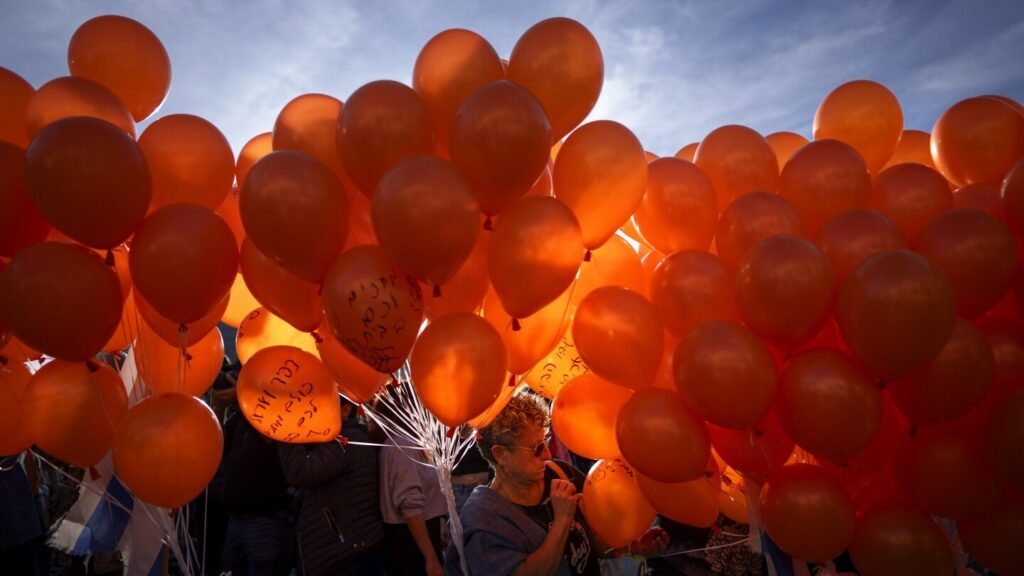TEL AVIV, Israel (news agencies) — Between 9 and 12 months old, babies learn to stand, say their first word, maybe take their first steps. As the family of Kfir Bibas, the youngest Israeli held in captivity in Gaza, celebrated his first birthday without him, they wondered which, if any, of the typical milestones they missed during those three months of his life.
“They’re supposed to see a lot of colors, but instead he’s seeing just darkness,” said Yosi Shnaider, a cousin. “He’s supposed to be learning to walk, but he has nowhere to do it. He’s supposed to be able to hold a spoon for the first time, he’s supposed to be tasting so many different foods for the first time.”
Kfir, brother Ariel, and parents Shiri and Yarden Bibas were kidnapped Oct. 7 when Hamas attacked Israel, killing 1,200 people and taking about 250 hostage. On Thursday in Tel Aviv, hundreds of people gathered for what Shnaider called “the saddest birthday in the world.”
Kfir has been in captivity for a quarter of his life. The infant with red hair and a toothless smile has become a symbol across Israel for the helplessness and anger over the 136 hostages still in captivity in Gaza.
On Thursday, many people wore orange, a color inspired by Kfir and Ariel’s hair. They marked Kfir’s first year with performances by Israeli children’s music stars, who wrote a song in his honor, and released orange balloons inscribed with birthday wishes.
Since video emerged shortly after the attack showing the brothers swaddled in a blanket around their terrified mother with gunmen surrounding her, orange has come to represent the family across Israel. But to some relatives, it brings pain as well as hope and recognition.
Shnaider thinks about the birthday party they could have had as a family this week, out on the grass of the kibbutz, with balloons on all the trees.
“I wish we were having balloons of every color and not just orange,” Shnaider said. “I can’t even look at this color orange anymore.”
In Davos, Switzerland, Israeli President Isaac Herzog displayed a photo of a smiling baby Kfir in his as he addressed the World Economic Forum. And earlier in the week, at the family’s home in Kibbutz Nir Oz, relatives used orange balloons on the wall to cover bulletholes and spattered blood from the attack and filled his nursery school classroom with birthday decorations.
Kfir was the youngest of about 30 children, taken hostage Oct. 7. Since the Hamas attack sparked war, more than 24,000 Palestinians have been killed, according to the Health Ministry in Hamas-ruled Gaza, and some 85% of the narrow coastal territory’s 2.3 million people have fled their homes.
Under a weeklong temporary cease-fire in November, Hamas released 105 foreign workers, women, children and teens, but Shiri Bibas and her sons were not among them. Yarden Bibas, who was taken captive separately, appears in photos to have been wounded during the abduction. Little is known about the conditions of his wife and children.
Since the release, some freed hostages have been speaking out, hoping to pressure the government into reaching another deal. At their gathering, too, the Bibas family’s relatives pleaded with the Israeli government and international leaders to come to an agreement that would allow for the release of more hostages.
“There’s two children being held over there against all of the laws of wars, and the world doesn’t say anything. Where are all the leaders of the modern world?” Shnaider asked. “We need a deal, we need to free all 136 hostages, without exceptions.”
Tomer Keshet, a cousin of Yarden Bibas, said he can’t look at his own children without thinking of Kfir and Ariel, scared in a dark tunnel somewhere in Gaza.
“The last time I met Kfir, he had just learned how to crawl,” he said. “We were holding him and just keeping him close.”


